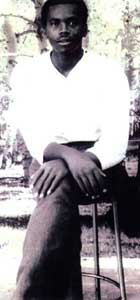Buddhism Behind Bars
By R. V. Scheide, Metro Active Books, April 13, 2005
San Quentin, CA (USA) -- Jarvis Jay Masters may be the most talented North Bay writer you've never heard of. If his work has indeed passed you by, perhaps it has something to do with his address: San Quentin's death row, where he has resided since 1990, after being convicted for his role in the murder of a prison guard in 1985.
 << Life Record: Jarvis Jay Masters writes from death row.
<< Life Record: Jarvis Jay Masters writes from death row.
Like most of the convicts on death row, Jarvis, 43, was raised in a violent environment. His parents were drug addicts, and at an early age, he began bouncing from one foster home to another. By the time he was 12, he was running the streets; at 19, he was sentenced to 10 years in San Quentin for a series of violent crimes.
Criminologists such as Lonnie Athens (profiled in Richard Rhodes' definitive book Why They Kill) tell us that overcoming such a background is practically unheard of. Yet if Masters' writings in his book Finding Freedom: Writings from Death Row (Padma Publishing; $12) are to be believed, that's precisely what the condemned inmate has done.
Finding Freedom is a collection of poems, short stories and journal entries that detail Masters' conversion to Buddhism behind bars. When exactly this conversion took place is never made clear, but we may presume it occurred sometime after his involvement in the killing of the prison guard. Nevertheless, there is a sincerity in Masters' writings that tells readers (at least this one) that his is no mere deathbed conversion.
"This was home," he writes in "Sanctuary," the opening piece describing his arrival in San Quentin in 1981. "For hours I couldn't bear the thought. The roaches, the filth plastered on walls, the dirt balls collecting on the floor and the awful smell of urine left in the toilet for God knows how long sickened me nearly to the point of passing out." Cleanliness is next to godliness, and Masters overcomes the squalor by vigorously scrubbing every square inch of the cell.
Masters' prose is just as spotless as that cell. Like Buddhism, writing came to him in prison, and the economy of style that comes to most writers only after many years of practice seems to have come to him naturally. He also has a gifted eye for story, and what author could ask for more fertile ground than inside San Quentin prison?
For example, the short story "Little Black Sparrow" conveys an early lesson taught to Masters by a fellow convict. In "A Reason to Live," Masters the student becomes teacher, convincing a new inmate that suicide is not the way out. "Funny How Time Flies" uses the fact that wristwatches no longer make a ticking sound as a device to humorously explore how the outside world leaves prisoners behind.
Finding Freedom pivots on Masters' PEN Award-winning poem "Recipe for Prison Pruno." Using the cut-up technique pioneered by Brion Gysin and William S. Burroughs, Masters juxtaposes the recipe for homemade liquor ("Take 10 peeled oranges . . . one 8-oz. can of fruit cocktail") with the statement made by the judge at his death sentence hearing. By the poem's end, this juxtaposition becomes the cold hard truth of Masters' predicament: "pour the remaining portion into two 16-oz. cups. / May God have mercy on your soul, / Guzzle down quickly! / Mr. Jarvis Masters. / Gulp Gulp Gulp!"
The short stories and journal entries following the poem document how Buddhism, including an empowerment ceremony performed in prison by Masters' teacher, Chagdud Tulku Rinpoche, has helped Masters cope with this truth. "My writing and spiritual practice have become inseparable," he notes in the epilogue.
Some critics--most notably University of Utah College of Law professor Paul Cassel, who reviewed Finding Freedom for the Washington Post--doubt that Masters' conversion to Buddhism is sincere. Cassel correctly points out that the inmate has carefully avoided mention of the violence that brought him to death row, and suggests that Masters is simply trying to save his own skin with his writings. "No doubt we will see these life-saving claims credulously reprinted when his execution approaches," Cassel writes.
Of course, there may be another reason the author eschews writing about the violence. Masters' appeal is currently before the State Supreme Court, and there is a chance that his death sentence--perhaps even his murder conviction--may be overturned. If that happens, perhaps we'll hear more from this talented writer. If it doesn't, well, there will be one more good reason to abolish the death penalty.

 << Life Record: Jarvis Jay Masters writes from death row.
<< Life Record: Jarvis Jay Masters writes from death row.